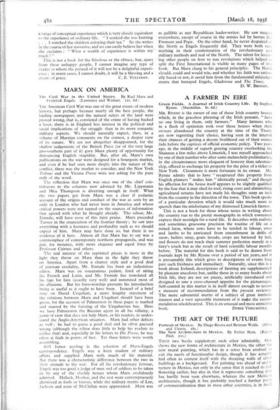MARX ON AMERICA
The Civil War in tha United States. By Karl Marx and Frederick Engels. (Lawrence and Wishart. 12s. 6d.)
THE American Civil War was one of the great events of modern history, but perhaps because nearly all the best people, the leading newspapers and the natural rulers of the land were proved wrong, that is, convicted of the crime of having backed a loser, there is in England less interest in the political and social implications of the struggle than in its more romantic military aspects. We should naturally expect, then, in a volume of Mandan comments on the contest, a deeper view of its nature. We are not altogether disappointed, for the shallow judgements of the British Press (or of the very large pro-southern part of it) gave Marx plenty of opportunity for denouncing English stupidity. But, after all, Marx's own publications on the war were designed for a bourgeois market, and even if he had seen more deeply into the nature of the conflict, there was the market to consider, and the New York Tribune and the Vienna Presse were not asking for the pure milk of the word.
The reflection that Marx was once one of the chief con- tributors to the columns now adorned by Mr. Lippmann and Miss Thompson is diverting enough in itself. What the two papers got from Marx was a clear if pedantic account of the origins and conduct of the war as seen by an exile in London who had never been in America and whose critical powers were not turned on the sources of information that agreed with what he thought already. The editor, Mr. Enmale, will have none of this faint praise. Marx preceded Turner in the enunciation of the frontier theory ; he saw into everything with a keenness and profundity such as we should expect of him. Marx may have done so, but there is no evidence of it here. Almost all that Marx has to say was a commonplace of contemporary northern propaganda, and was put, for instance, with more elegance and equal force by Professor Cairnes and others.
The real interest of the reprinted pieces is more in the light they throw on Marx than in the light they throw on America. Apart from a clumsy style and a good deal of partisan credulity, Mr. Enmale has been an industrious editor. Marx was an ostentatious pedant, fond of airing his French and Latin, and Mr. Enmale has translated all his tags for him (usually very well) and annotated most of his allusions. But his hero-worship prevents his introduction being as useful as it ought to have been. Instead of a brief note on David Urquhart, a more lengthy statement of the relations between Marx and Urquhart should have been given, for the account of Palmerston in these pages is marked and marred by the buzzing of the Urquhartian bee. Here we have Palmerston the Russian agent in all his villainy, a point of view that does not help Marx, or his readers, to under- stand the Anglo-American situation. Marx had other defects as well ; he had to guess a good deal and he often guessed wrong (although the editor does little to help his readers to realise that) and, especially in his letters to Die Presse, he was often at fault in points of fact. Yet these letters were worth assembling.
Still better reading is the selection of Marx-Engels correspondence. Engels was a keen student of military affairs and supplied Marx with much of his material. But there was a characteristic difference between the two in their attitude to the war. Foi all his revolutionary fervour, Engels was too good a judge of men and of soldiers to be taken in by any of the shoddy heroes whom Marx credulously admired. Halleck, Hooker, and the rest were contemptuously dismissed as fools or knaves, while the military merits of_Lee, Jackson and even of McClellan were appreciated. Marx was
as gullible as any Republican leader-writer. He saw treason everywhere, except of course in the armies led by heroes like Fremont and Pope. On the other hand, he never despaired of the North as Engels frequently did. They were both very scathing in their condemnation of the revolutionary and military methods and zeal of the North. The talent for lectur- ing other people on how to run revolutions which helped to split the First International is visible in many pages of this book. But Marx clung to his general principles. The North should, could and would win, and whether his faith was ration- ally based or not, it saved him from the fundamental misjudge- ments that betrayed Engels, Gladstone and The Times.
D. W. BROGAN.














































 Previous page
Previous page